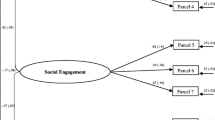Abstract
As a complement to objective measures of treatment effectiveness, behavioral researchers have utilized social validation procedures to gather information from significant others regarding the social importance of behavior changes. The present study represents an attempt to socially validate the efficacy of behavior therapy with autistic children. Thirty-four parents of autistic children and 18 parents of normal children judged (via questionnaire) the behavior of four autistic children before and after behavior therapy. The results indicated that (1) parents socially validated the effects of behavior therapy in that they judged the children as significantly improved after treatment, and (2) the effects of treatment were also socially validated by the parents' indication that they were more willing to interact with the children after treatment than before treatment.
Similar content being viewed by others
References
Anastasi, A.Psychological testing (4th ed.). New York: Macmillan, 1976.
Bogaard, L.Relationship between aggressive behavior in children and parent perception of child behavior. Unpublished doctoral dissertation, University of Oregon, 1976.
Christophersen, E. R., & Rapoff, M. A. Pediatric psychology: An appraisal. In B. B. Lahey & A. E. Kazdin (Eds.),Advances in clinical child psychology, (Vol. 3). New York: Plenum Press, 1980.
Fagot, B. E. Sex differences in toddlers' behavior and parental reaction.Developmental Psychology, 1974,10, 554–558.
Fawcett, S. B., & Miller, L. K. Training public-speaking behavior: An experimental analysis and social validation.Journal of Applied Behavior Analysis, 1975,8, 125–136.
Forehand, R., Wells, K. C., & Griest, D. L. An examination of the social validity of a parent training program.Behavior Therapy, 1980,11, 488–502.
Furman, N. Promoting social development: Developmental implications for treatment. In B. B. Lahey & A. E. Kazdin (Eds.),Advances in clinical child psychology (Vol. 3). New York: Plenum Press, 1980.
Gottlieb, J., & Gottlieb, B. W. Stereotypic attitudes and behavior intentions toward handicapped children.American Journal of Mental Deficiency, 1977,82, 65–71.
Gottlieb, J., & Siperstein, G. N. Attitudes toward mentally retarded persons: Effects of attitude referent specificity.American Journal of Mental Deficiency, 1976,80, 376–381.
Graybill, D., & Gabel, H. Relationship of teacher nominations for parent counseling to perception of children's behavior problems.Southern Journal of Educational Research, 1978,12, 151–159.
Griest, D., Wells, K. C., & Forehand, R. An examination of predictors of maternal perceptions of maladjustment in clinic-referred children.Journal of Abnormal Psychology, 1979,88, 277–281.
Kazdin, A. E. Assessing the clinical or applied importance of behavior change through social validation.Behavior Modification, 1977,1, 427–451.
Kellerman, J., & Katz, E. R. Attitudes towards the division of child-rearing responsibilities.Sex Roles, 1978,4, 505–512.
Lovaas, O. I., Koegel, R. L., Simmons, J. Q., & Long, J. S. Some generalization and follow-up measures on autistic children in behavior therapy.Journal of Applied Behavior Analysis, 1973,6, 131–166.
Maloney, D. M., Harper, T. M., Braukmann, C. J., Fixsen, D. L., Phillips, E. L., & Wolf, M. M. Teaching conversation related skills to predelinquent girls.Journal of Applied Behavior Analysis, 1976,9, 371.
Margolin, G., & Patterson, G. R. Differential consequences provided by mothers and fathers for their sons and daughters.Developmental Psychology, 1975,11, 537–539.
Mealor, D. J., & Richmond, B. O. Adaptive behavior: Teachers and parents disagree.Exceptional Children, 1980,46, 386–389.
Minkin, M., Braukmann, C. J., Minkin, B. L., Timbers, G. D., Timbers, B. J., Fixsen, D. L., Phillips, E. C., & Wolf, M. M. The social validation and training of conversational skills.Journal of Applied Behavior Analysis, 1976,9, 127–139.
Morris, J. D., & Arrant, D. Behavior ratings of emotionally disturbed children by teachers, parents, and school psychologists.Psychology in the Schools, 1978,15, 450–455.
National Society for Autistic Children. National Society for Autistic Children definition of the syndrome of autism.Journal of Autism and Childhood Schizophrenia, 1978,8, 162–167.
Noller, P. Cross-gender effect in two-child families.Developmental Psychology, 1980,16, 159–160.
Patterson, G. R. Mothers: The unacknowledged victims.Monographs of the Society for Research in Child Development, University of Chicago Press for the Society for Research in Child Development, 1980.
Prout, H. T., Harper, C., Snider, B., & Lindgren, S. Comparisons between mothers' and teachers' evaluations of developmental status.Journal of Pediatric Psychology, 1978,3(2), 57–61.
Rothbart, M. K., & Maccoby, E. E. Parents' differential reactions to sons and daughters.Journal of Personality and Social Psychology, 1966,1, 237–243.
Schopler, E., & Reichler, R. J. How well do parents understand their own psychotic children?Journal of Autism and Childhood Schizophrenia, 1972,2, 387–400.
Schreibman, L., Koegel, R. L., Mills, J. I., & Burke, J. C. Social validation of behavior therapy with autistic children.Behavior Therapy, 1981,12, 610–624.
Schreibman, L., Runco, M. A., Mills, J. I., & Koegel, R. L. Teachers' judgments of improvements in autistic children in behavior therapy: A social validation. In R. L. Koegel, A. Rincover, & A. W. Egel (Eds.),Educating and understanding autistic children. Houston, Texas: College-Hill Press, 1982.
Wolf, M. M. Social validity: The case for subjective measurement or how applied behavior analysis is finding its heart.Journal of Applied Behavior Analysis, 1978,11, 203–214.
Author information
Authors and Affiliations
Additional information
This research was supported by U.S.P.H.S. Research Grants MH 29231 and MH 29210 from the National Institute of Mental Health, and by the Department of Psychology of the Claremont Graduate School. The authors wish to thank Jack Mills, Marjorie Charlop, Ph.D., and Ruth Monroe, Ph.D., for their valuable assistance.
Rights and permissions
About this article
Cite this article
Runco, M.A., Schreibman, L. Parental judgments of behavior therapy efficacy with autistic children: A social validation. J Autism Dev Disord 13, 237–248 (1983). https://doi.org/10.1007/BF01531563
Issue Date:
DOI: https://doi.org/10.1007/BF01531563




